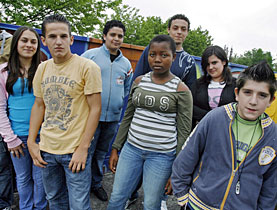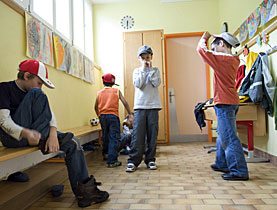Switzerland is “no longer an island”

Switzerland is not so very different to its European neighbours, despite the country's traditional isolation from the European Union, a study has found.
The Swiss Social Report 2008 revealed, however, that there was still some way to go to close the gaps in income, education and between the sexes.
The report, unveiled on Tuesday in Bern, compared economic, social and cultural developments between Switzerland, several European countries and the United States.
It found that social differences were becoming smaller across Europe and that this did not depend on whether a country was an EU member or not.
“Women’s participation in the workforce has consistently increased in Switzerland so that it now about average for Europe,” Christian Suter, a sociology professor at Neuchâtel University who headed the research, told swissinfo.
The report, the third of its kind but the first to compare Switzerland with other countries, was carried out by the Swiss Foundation for Research in Social Sciences.
It found the same trend towards the middle ground in marriage, divorce, the birth rate and in the population age structure.
Switzerland’s political landscape seems to be adapting as well. “For a long time in Switzerland there used to be parties that were only really anchored in one canton or region,” explained Suter.
“Now they are all over the country, like in other European countries.”
Surprising attitudes
Attitudes towards foreigners – who make up one fifth of the population – were also examined. Much to the authors’ surprise, they were mainly positive, with only a little more than 20 per cent saying they feared the effects of migrants on the economy and Switzerland’s cultural life.
This was a better result than in the other European countries surveyed, which included neighbours Germany and France, as well as Britain.
Suter said that this could be a result of the Swiss system of direct democracy, in which the population votes on issues of importance.
In the 1960s and 1970s several initiatives dealt with the high numbers of foreigners in Switzerland, particularly following an influx of migrant workers from southern Europe.
In this way, Suter says, Switzerland managed to give the immigrant question a political legitimacy much earlier than other European countries.
Inequalities still rife
However, the Swiss fell down when it came to equal opportunities in education.
“There is a strong ‘inheritance’ in families in the education system in Switzerland,” said Suter. This means that family background is often key in educational achievement, with hurdles especially high for those of a lower socio-economic status.
This trend already starts at primary school and can continue through a child’s life. Particular criticism was levelled at the fact that a sizeable minority of school leavers cannot find an apprenticeship or continue their studies.
Also highlighted was the continuing pay gap between the different social classes and the sexes. Women of the same training and education were still earning less than men.
The authors said that the situation had not changed much over the past 20 years.
Sweden and France had the smallest pay gap and in all other countries the difference was much smaller than in Switzerland, the study found.
swissinfo, Renat Künzi with agencies
The Swiss Social Report 2008 is the third of its kind but the first to compare social change in Switzerland with other countries.
Previous studies were conducted in 2000 and 2004.
Researchers examined the distribution of social goods, cultural diversity, social inclusion, political structure and the environment based on 75 indicators including working conditions, national origin, and the distribution of domestic roles.
The countries analysed included: Germany, France, Britain, Sweden, Spain and the United States.
Funding was provided by the Swiss National Science Foundation, the Swiss Foundation for Research in Social Sciences and Neuchâtel University.
The report is available in print and online in English.

In compliance with the JTI standards
More: SWI swissinfo.ch certified by the Journalism Trust Initiative



You can find an overview of ongoing debates with our journalists here . Please join us!
If you want to start a conversation about a topic raised in this article or want to report factual errors, email us at english@swissinfo.ch.